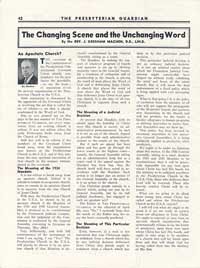This Day in Presbyterian History:
What Constitutes Schism?
 In the May 4, 1936 edition of the Presbyterian Guardian (now on-line), Dr. J. Gresham Machen wrote an article on what constituted schism. The times in which he was writing were perilous times for both Reformed ministers and the members of their churches. Already a Mandate had been passed by the 1934 General Assembly of the Presbyterian Church, U.S.A., which threatened suspension of any elder, teaching or ruling, who would support by their presence, purse, and prayers any board outside of the denominational boards. Indeed, young pastors could not be received into churches or presbyteries who refused to support the official boards of the church. In the midst of this, a Presbyterian Constitutional Covenant Union had been set up by the small Presbyterian conservative faction in the church. One of the principles of that Covenant union plainly contemplated separation from the main-line church if it continued in its apostasy.
In the May 4, 1936 edition of the Presbyterian Guardian (now on-line), Dr. J. Gresham Machen wrote an article on what constituted schism. The times in which he was writing were perilous times for both Reformed ministers and the members of their churches. Already a Mandate had been passed by the 1934 General Assembly of the Presbyterian Church, U.S.A., which threatened suspension of any elder, teaching or ruling, who would support by their presence, purse, and prayers any board outside of the denominational boards. Indeed, young pastors could not be received into churches or presbyteries who refused to support the official boards of the church. In the midst of this, a Presbyterian Constitutional Covenant Union had been set up by the small Presbyterian conservative faction in the church. One of the principles of that Covenant union plainly contemplated separation from the main-line church if it continued in its apostasy.
Responding to that Covenant Union were those ministers and churches who denounced the sin of schism, plainly inferring that any who contemplated separation would be guilty of the sin of schism. It was that false charge which Machen proceeded in this article to refute, and refute very strongly.
Consider his words here. He wrote just eight months before his untimely death, “It is not schism to break away from an apostate church. It is a schism to remain in an apostate church, since to remain in an apostate church is to separate from the true church of Jesus Christ.” He then went on to explain that as of May 4, the Mandate of 1934 and 1935 had yet to be declared constitutional. It was simply an administrative pronouncement up to that time. If the General Assembly of 1936, to be held in several weeks, approved it, then it would be an action of the church. If that happened, as we know from the position of hindsight that it did, then all true believers had it as their duty to depart from the denomination because that church had placed the word of man above the Word of God and has dethroned Jesus Christ.
 Dr. Machen was seeking to go to the last measure to keep the church from going down this path of apostasy. Yet it would be a vain seeking as the May 1936 General Assembly did approve the Mandate of 1934, and the die was cast. All those ministers, who had rejected the earlier Mandate, and had appealed to the next highest court their suspension from the ministry by their respective presbyteries, had their appeals denied.
Dr. Machen was seeking to go to the last measure to keep the church from going down this path of apostasy. Yet it would be a vain seeking as the May 1936 General Assembly did approve the Mandate of 1934, and the die was cast. All those ministers, who had rejected the earlier Mandate, and had appealed to the next highest court their suspension from the ministry by their respective presbyteries, had their appeals denied.
To read the full article by Dr. Machen, click here.
Words to Live By: God alone is Lord of the conscience and has left it free from any doctrines or commandments of men, (a) which are in any respect contrary to the Word of God,or (b) which, in regard to matters of faith and worship are not governed by the Word of God.
Through the Scriptures: Psalm 70 – 72
Through the Standards: Sanctification here is continual warfare
WCF 13:2, 3
“This sanctification is throughout, in the whole man; yet imperfect in this life, there abiding still some remnants of corruption in every part; whence arises a continual and irreconcilable war, the flesh lusting against the Spirit, and the Spirit against the flesh. In which war, although the remaining corruption, for a time, may much prevail; yet, through the continual supply of strength from the sanctifying Spirit of Christ, the regenerate part does overcome; and so, the saints grow in grace, perfecting holiness in the fear of God.”
WLC 78 — “Whence arises the imperfection of sanctification in believers?
A. The imperfection of sanctification in believers arises from the remnants of sin abiding in every part of them, and the perpetual lustings of the flesh against the spirit; whereby they are often foiled with temptations, and fall into many sins, are hindered in all their spiritual services, and their best works are imperfect and defiled in the sight of God.”
Image sources :
1. Page 2 of the 4 May 1936 issue of The Presbyterian Guardian.
2. Photo of Dr. J. Gresham Machen, as found on page 3 of Our Faculty: Westminster Theological Seminary, Philadelphia. Prepared by The Student Committee on Publications, Westminster Students’ Association, 1931.

No comments
Comments feed for this article